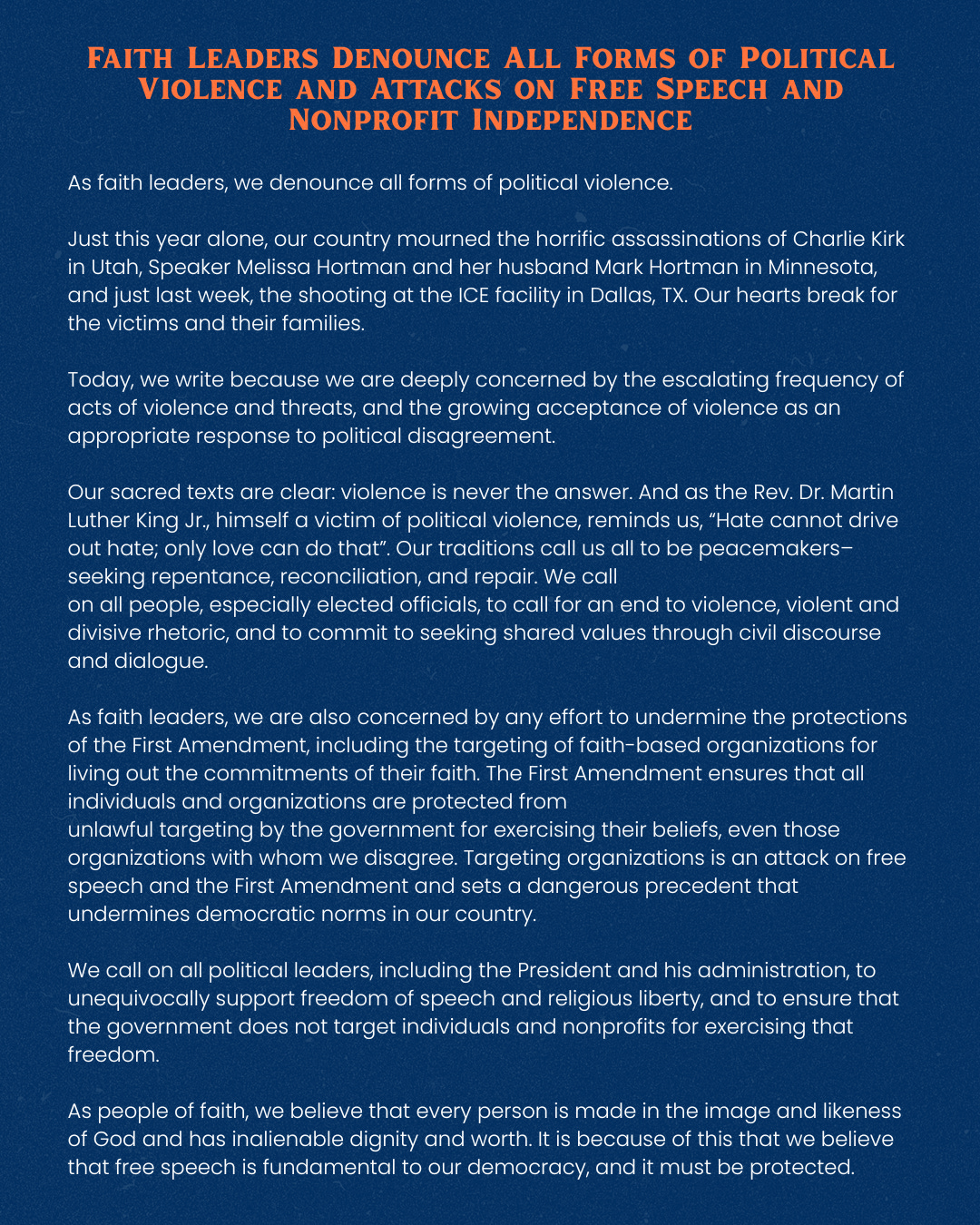Choosing Dialogue Over Violence
As our government shuts down, faith leaders condemn violence, division, and threats to our rights.
Yesterday, our federal government began an indefinite shutdown. Federal workers face uncertainty, and essential services are stalled. On the same day, more than 150 faith leaders, including myself, joined together to release a statement denouncing all forms of political violence, attacks on free speech, and nonprofit independence. This letter was a plea to our political leaders to address the dangerous rise of political violence and the growing threats against civil society.
As faith leaders, we are sounding the alarm about the moral and democratic crisis we are facing. President Trump has shown a reckless disregard for both our government and our rights time and time again. Just in the last week, he issued a memorandum directing law enforcement to investigate and prosecute nonprofits and faith-based groups under the framework of “countering domestic terrorism.” Then this Tuesday, he declared that our major cities should be used as “training grounds” for the military. These words and actions not only undermine the institutions of our democracy but also cultivate a culture of division in a moment when we should be working to rebuild trust and peace.
This shutdown is not just about a budget. It is about the collapse of trust, the refusal to compromise, and the deep divisions that have hollowed out our politics. It is a visible sign of a democracy in crisis. A government that cannot function because it has forgotten how to listen, how to seek common ground, and how to put the common good above partisan victory. If our leaders rely on divisive rhetoric, they will continue to feed the flames of extremism. And the more ordinary citizens grow accustomed to shutdowns and breakdowns, the more space violence will find to flourish. The moral challenge of this moment is whether we will normalize this path or resist it.
This failure of moral leadership does more than stall the workings of government or wound our economy. It erodes the soul of our civic life. And in its absence, the risk for more divisive rhetoric and political violence fills the void. We see it in the bitter blame-shifting over this shutdown, and we have seen it in tragedies that pierce our nation. The assassination of Charlie Kirk, the recent shooting at the Dallas ICE facility, and the attack on the Latter-day Saints congregation all leave behind grieving families and shattered communities. These tragedies reveal a nation that is increasingly tempted to answer disagreement not with dialogue, but with rage, threats, and bloodshed.
This week on my podcast, I spoke with Jennifer Walker Thomas, the co-executive director of Mormon Women for Ethical Government. In the face of terrible violence and death, she offered these sage words: “I think you don’t know your commitment to peacemaking until you are personally faced with violence, reacting with deep empathy to those who might have harmed us.” Her witness and the work of groups like hers remind us that the way of peace, though difficult, is still possible.
This is why our broad coalition of clergy and faith leaders has spoken with one voice. The release of this statement is more than a protest. It is a moral witness. What we need now is not militarization, not violence, not dismantling of healthcare and public services. What we need is leadership—moral leadership—that calls us back to our better angels. We need our leaders on both sides of the aisle to remember that government exists to serve its citizens, not to hold them hostage in partisan standoffs. We need a renewed commitment to dialogue across differences, a shared determination to preserve democracy, and a refusal to accept violence as inevitable.
An indefinite shutdown is a political failure. But the greater failure would be to treat it as normal, to shrug at violence, and to abandon the work of reconciliation. Shutdowns will end eventually, and elections will come and go. But the moral test of our democracy is whether we can hold fast to the deeper commitments that should bind our nation together: nonviolence, free speech, human dignity, and shared responsibility for the common good.
People of faith across traditions are called to be peacemakers in a culture that has forgotten peace. That is why I am asking you to help amplify this statement. Share it with your congregations, with your colleagues, and with your communities. Lift it up in your pulpits and in your prayers. Forward it to friends and fellow clergy. Our witness is strongest when it is collective, when the voice of conscience is multiplied across traditions and communities.



Just bought your new book, The False White Gospel. My church book club will begin reading it together next month.
Your voice has been around a long time. It was needed much in the past, and even more now.
The step forward requires the insights so well expressed to be broadcast not only to those who support the message, but to those who are blinded by the veil of tribal loyalty. We need an elevated spoke person around whom the churches can support. The message of love as expressed by Martin Luther King would have been stunted without the T.V. exposure of the violent reactive behavior of tyranny. This was true also of T.V.'s exposure of our military behavior in Viet Nam with the little girl running toward the camera with all the burns from the dropping of Napalm. Showing what is happening to people in Gaza is barely exposed in our media. We need to put our money together to spread the visual heartbreak of families being torn apart by ICE, the terrible trials and tribulations of the hundred of thousands having their employment terminate with no recourse, etc. No one to step into the leadership role is not acceptable. This absence is what tyranny always encourages.